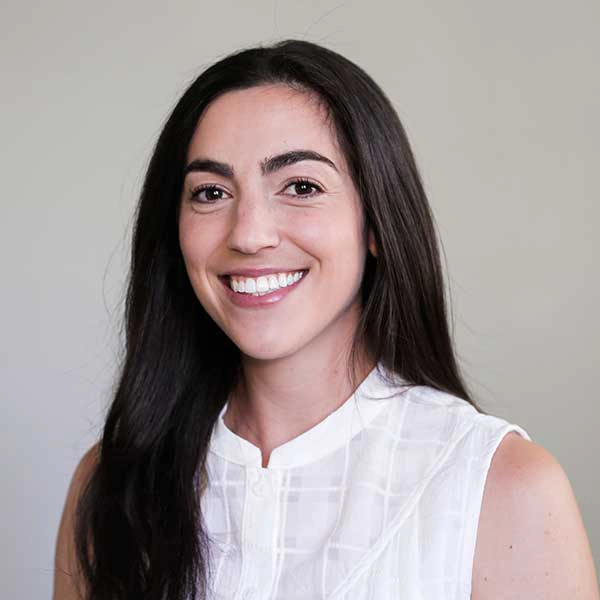Public health alumna strives to improve the health of the nation through physical activity
Meet Malorie Polster

Malorie Polster supports the U.S. Department of Health and Human Services (HHS) Office of Disease Prevention and Health Promotion (ODPHP) to promote and increase access to physical activity in communities across the United States. (Photo Credit: Hannah P Clark)
Although most people know physical activity is important for good health, most Americans aren’t getting enough. Malorie Polster sees this as a challenge.
However, before she was researching the benefits of physical activity with the HHS, Polster was reading books on infectious disease and watching documentaries on the obesity epidemic. Her knowledge and experience grew as she earned a bachelor of science in kinesiology with a minor in public health, followed by time spent promoting physical activity through AmeriCorps Volunteer in Service to America as the community health director at Active Southern West Virginia. Then, she earned her masters of public health in behavioral sciences and health education from the Rollins School of Public Health, Emory University.
Upon graduation, Polster was excited to find an opportunity that would leverage her professional and academic experience. She applied for a fellowship with the HHS Office of Assistant Secretary for Health in the Office of Disease Prevention and Health Promotion (OASH/ODPHP) program, and was thrilled when accepted.
The Oak Ridge Institute for Science and Education (ORISE) Research Participation Programs at HHS are designed to provide students and recent graduates opportunities to participate in project-specific HHS research and developmental activities. Polster, under the guidance of her mentor Katrina Piercy, has been diligently assisting ODPHP’s Division of Prevention Science since joining on.
The overall goal of Polster’s fellowship is to get Americans moving more and increase the proportion of Americans meeting the physical activity recommendations set forth by HHS. The benefits of physical activity are extensive and can even lower the country’s mortality rate. In her role, she focused on two major projects: the National Youth Sports Strategy (NYSS) and the Physical Activity Guidelines.
The NYSS is a federal roadmap with actionable strategies that parents, coaches, organizations, communities, and policymakers can use to help ensure all youth have the opportunity, motivation and access to play sports. The development of the NYSS involved having scientists like Polster gather and synthesize research from the scientific community and best practices from successful youth sports programs. The strategy was launched several months after Polster joined as a fellow with HHS.
“After the NYSS launch in September 2019, the majority of my fellowship focused on supporting the NYSS implementation,” she noted. “My efforts quickly shifted from getting the NYSS published to getting the best practices from the NYSS off the pages and into practice in communities across the United States.”
Polster engages with youth sports implementers across the United States. She assists with presentations, webinars and workshops that have helped disseminate youth sports research and promote safe, fun, inclusive, developmentally appropriate and accessible youth sports opportunities.
She is also helping support NYSS implementation through the NYSS Champions Partnership Initiative, and gave additional support to the Science Board Subcommittee of the President’s Council on Sports, Fitness & Nutrition during their efforts to provide scientific guidance on youth sports to the Council.
In her other project, Polster helps promote the Physical Activity Guidelines for Americans through the Move Your Way® campaign. The Physical Activity Guidelines has given health professionals and policymakers evidence-based recommendations on how everyone can improve their health through regular physical activity. She provides feedback on research briefs, screening tools, moderator’s guides and draft educational tools—such as fact sheets and videos—to inform the development of new Move Your Way® resources and help grow the campaign.
“Physical activity offers both short- and long-term health benefits for all individuals. Reduced risk of all-cause mortality, cardiovascular disease, and depression are just some examples,” Polster said. “Reducing barriers to physical activity and increasing physical activity for all Americans would help make individuals, and communities, healthier.”
Along with her team, Polster’s research for the Move Your Way® campaign highlighted strategies for improving access to physical activity, promoting its benefits and helping people overcome common barriers. Their continued study into the latest science and best practices will remain an important part of efforts to increase physical activity levels in the United States.
Whether doing individual study or discussing their research as a team, Polster is glad that she’s able to put her knowledge towards meaningful research alongside her peers, which has helped her learn and grow. She said the supportive atmosphere from everyone around her makes her feel prioritized.
Polster plans to continue working in a similar field after her fellowship is over. Until then, she’s been able to publish her research in the Journal of Physical Activity and Health and presented “Best Practices for Coaches from the National Youth Sports Strategy” at the SHAPE America National Convention.
Polster heartily recommends ORISE’s ODPHP program. “It has been such a great opportunity to be under an accomplished mentor and collaborate with the leaders and subject matter experts in the field of physical activity and public health. It’s an invaluable contribution to my personal and professional growth,” finished Polster.
Polster’s continued study into the latest science and best practices will remain a part of efforts to increase physical activity levels in the United States.
The OS/OASH Research Participation Program is managed by the Oak Ridge Institute for Science and Education (ORISE) under an interagency agreement between the U.S. Department of Health and Human Services and the U.S. Department of Energy (DOE). ORISE is managed for DOE by ORAU.
